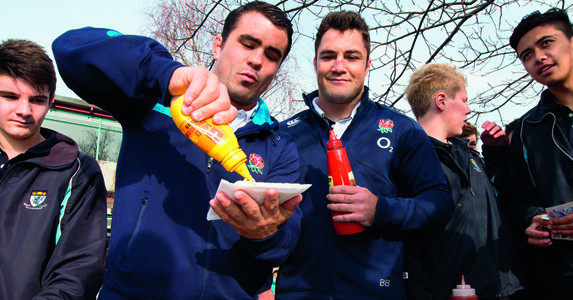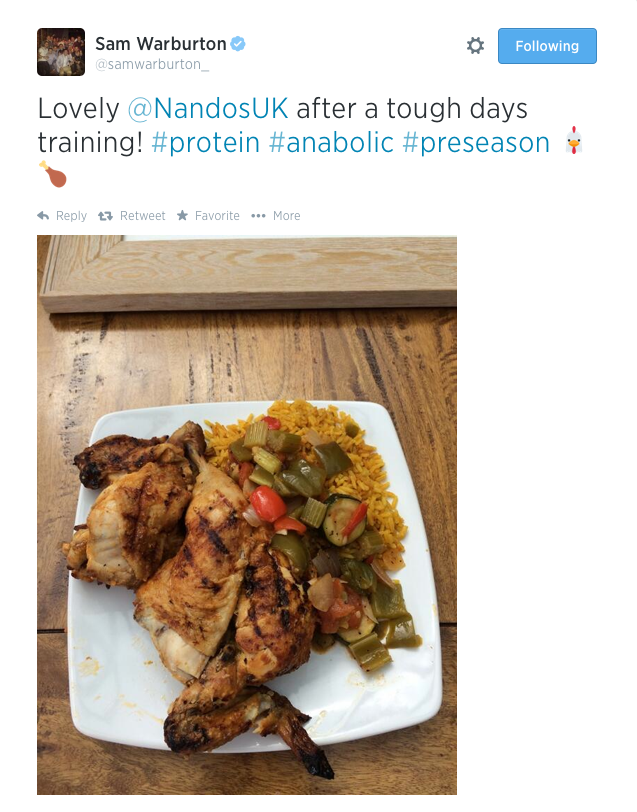It's essential to eat well during pre-season training if you want to reach peak fitness in time for your first league match. Here are the top 10 foods all rugby players should be eating to help make those sessions pay off...
THE END of summer is synonymous with the conclusion of pre-season training. It’s the time of year when clubs can reflect on all the hard work that has been done; the beers and ice cream have been sweated out, and final preparations are being made for the opening game of the season.
But why stop the good work? Rugby World is here to help! We asked England’s nutritionist Matt Lovell for the top ten food groups all rugby players should be eating as we draw ever closer to the regular season, to ensure they reach their peak fitness and sustain it.

Life’s a beach: Exeter Chiefs get put through their paces on Exmouth Beach
1) The Broccoli family
“Broccoli supplies important detoxifying chemicals,” says Lovell. “Other vegetables you can eat are brussel sprouts, cauliflower, kale, bok choi and cabbage. They will aid recovery, liver function and increase antioxidant protection. They are also good for maintaining hormonal balance.
“There’s a link between poor health (especially prostate health in men) and plastics in the environment. You can’t do this every time, but it’s worth considering getting your veg from a fruit stall that sells produce in paper bags, and likewise your meat from a butcher occasionally.”
2) Eggs
“They’re very high in high-quality protein, B vitamins, zinc and good fats. They’re good for sustaining lean body mass and rebuilding muscle, and are also beneficial for your immune system and hormonal balance.
“It’s a myth that too many eggs cause high cholesterol, and you can eat three or four a day if you’re training. There’s a much greater link between excess sugar and insulin to high cholesterol.”

On yer bike: Billy Vunipola ticking over during a Sarries pre-season session
3) Wild Salmon
“It’s higher in essential fats and protein, and lower in total and omega 6 fats than other salmon. You also get too much total and omega 6 fats from eating too many grains, and in excess they are pro-inflammatory for your joints and muscles. You can buy frozen wild salmon quite cheaply in supermarkets.”
4) Beans and Pulses
“Kidney beans, chickpeas, peas and lentils. They’re very high in fibre and protein, and they’re rich in folate and other B vitamins. They’re high in minerals such as magnesium, too, which help your muscles relax and recover.
“Fibre is essential for optimum digestion and colon health. This food group, also known as slow carbs, are two thirds carbs and one third protein, and release energy slowly – a good lunch option.”
5) Chicken and turkey
“A nice, high-quality, lean protein source. You should always buy free range minimum, and preferably organic. That means the animal won’t have been given antibiotics or hormones, and will have been fed organic food itself. You want to be eating as close as you can to wild meat.
“Turkey is a fraction leaner, but other than that they’re very similar.”
6) Oats
“Cook them with semi-skimmed milk or water. They’re a source of slow-release energy and are high in fibre. They’re also beta glucan rich, which helps immune function, and make a perfect pre-training breakfast.”
7) Blueberries
“They contain high levels of protective nutrients which stop the ageing process. A car gets rusty when it gets old, and the human body is the same. Cells decay, skin gets wrinkly and collagen breaks down. Blueberries are the best at slowing down that process, though other berries are good too.”

Hard graft: Quins preparing ahead of the 2016/17 season
8) Sweet potato
“They contain beta carotene, like carrots, though normal potatoes are actually higher in all other nutrients. Sweet potatoes are higher in carbohydrate but lower on the glycemic index, and provide a good starch for energy. They’re another slow carb, while normal potatoes only have the effects of slow carbs when combined with other vegetables or lentils.”
9) Coconut and olive oil
“Coconut oil is good for your immune function and digestion, and kills bad bacteria. It burns quickly, like a carb, and is heat stable. In other words, when you heat it to a high temperature, it doesn’t de-nature.
“Olive oil is full of flavonoids and is anti-ageing. Use coconut oil for frying, and drizzle olive oil over salads and cooked food.”
Organic coconut oil makes a great change to how I cook, eat and feel. Thanks @LoveCoconutUK really enjoying the stuff pic.twitter.com/EZIh7r2zDa
— Jonny Wilkinson (@JonnyWilkinson) March 15, 2014
10) Spices
“Garlic, oregano, chilli pepper, paprika, chilli… you need a well-stocked kitchen to flavour your food with the right sort of spices. They’re anti-inflammatory and immune-enhancing, and the best one, which I take as a supplement and eat once a week, is turmeric.”
This article first appeared in July 2014. Follow Matt Lovell on Twitter @mattlovell. Click here to see what else you should be eating and to get 20 essential recipes for healthy eating!
For the latest Rugby World subscription offers, click here.






